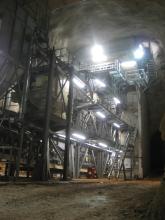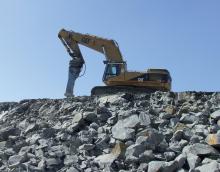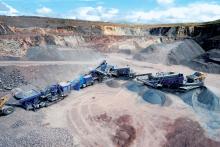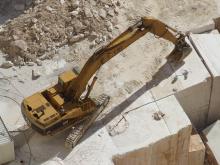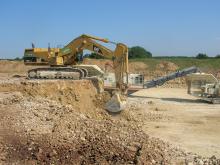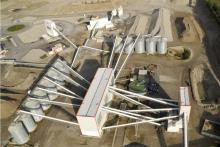
Investing in new equipment and selective working has enabled Alves Ribeiro's quarry near Lisbon to remain profitable despite Portugal's ongoing recession. Claire Symes reports
High in the hills above the vibrant city of Lisbon is a quarry which is equally as vibrant, despite the current recession in Portugal.
Alves Ribeiro's Moita da Ladra quarry has seen its output drop from 240,000tonnes in 2002 to 100,000tonnes this year but has still managed to remain profitable. According to Alves Ribeiro equipment director Joãd Abecasis, the prosperity of the quarry has been maintained through a combination of investment and carefully selecting its customers.
Extraction at Moita da Ladra started in the 1930s and the quarry basalt intrusion that covers 11.5ha, was acquired by Alves Ribeiro in 1992. "It took seven years to get permission to reopen the quarry," said Abecasis. "In Portugal, if a quarry is shut for six months, you have to reapply for permission, but gaining permission gives us a long term resource - at 2002 levels, there are reserves here to last another 30 years." Moita da Ladra supplies crushed stone for road construction and fines for concrete to sites within a 50km radius but much of the production is used by Alves Ribeiro's own construction company. Alves Ribeiro has a wide range of business interests, including a bank.
"Demand for aggregates has fallen in Potugal because of the current economic climate but we are selective about which projects we supply," said Abecasis. "If we have a buyer at the right rate, then we sell, if not then we stockpile material. Generally material from Moita da Ladra sells for €9 to €11 with road stone making up around 70% of the business." Drilling and blasting at Moita da Ladra is usually carried out twice a month to extract around 10,000tonnes of rock from 10m high benches. The floor of the quarry is currently 80 to 90m below ground level. Blasting is done using 12% dynamite and 70% ANFO with 25millisecond delays between 3.5inch diameter holes, drilled to 12m depths with a 3m by 3m spacing.
The quarry is close to local communities so Alves Ribeiro carefully monitors both noise and vibration but according to Abecasis, the levels of both are currently much lower than legislation allows for. The quarry also closes at 5pm to ensure even the low levels of noise and vibrations do not disturb the quarry's neighbours.
Despite the gloomy economic forecast, the company also chose to invest in new crushing and screening equipment at the quarry to ensure maximum efficiency and minimum operating costs.
When Alves Ribeiro took over Moita da Ladra, the quarry only had one primary crusher located on the quarry floor. Now the site has a state of the art
The computer controlled crushing
and screening system, which was specially designed for the site, has a Dragon MR107 primary crusher and two HP300s for secondary and tertiary crushing. The quarry also has three TS300 screens to produce 0-4mm, 2-6mm,
4-12mm, 10-16mm and 15-20mm gradings. The whole system is fully enclosed to reduce dust and noise levels and the material is also actively dust suppressed using sprays.
The system is fully automated with a focus on high quality production. "The speed of the conveyors is continuously varied to match both the power input to the plant and the volume in each of the crusher hoppers. Once the system is working, the operator does not need to remain in the control station because alarms will sound or the system will stop if it becomes unsafe or there is a problem," said Abecasis.
The screens feed the graded material into Moita da Ladra's six storage silos, which have a capacity of 140 to 150tonnes each.
Alves Ribeiro's focus on cost control includes trying to complete all processing during the morning when electricity costs are lower.

